Abstract
Monoclonal antibodies were raised against prostate-specific antigen (PSA) by immunization with purified free PSA, i.e. not in complex with any protease inhibitor (F-PSA) and PSA in complex with alpha1-anti-chymotrypsin (PSA-ACT). Epitope mapping of PSA using the established monoclonal antibody revealed a complex pattern of independent and partly overlapping antigenic domains in the PSA molecule. Four independent antigenic domains and at least three partly overlapping domains were exposed both in F-PSA and in the PSA-ACT complex, while one antigenic domain was specific for F-PSA. The different domains contained both continuous and discontinuous epitopes. The combination of antibodies recognizing antigenic domains exposed both in F-PSA and PSA-ACT made it possible to develop several highly sensitive sandwich immunoassays for determination of total PSA, i.e. F-PSA + PSA-ACT, with the same molar response for F-PSA and PSA-ACT. Assays specific for F-PSA (cross-reactivity between F-PSA and PSA-ACT < 1%) were developed by the combination of antibodies recognizing epitopes exposed only in F-PSA and antibodies recognizing epitopes exposed both in F-PSA and PSA-ACT.
Full text
PDF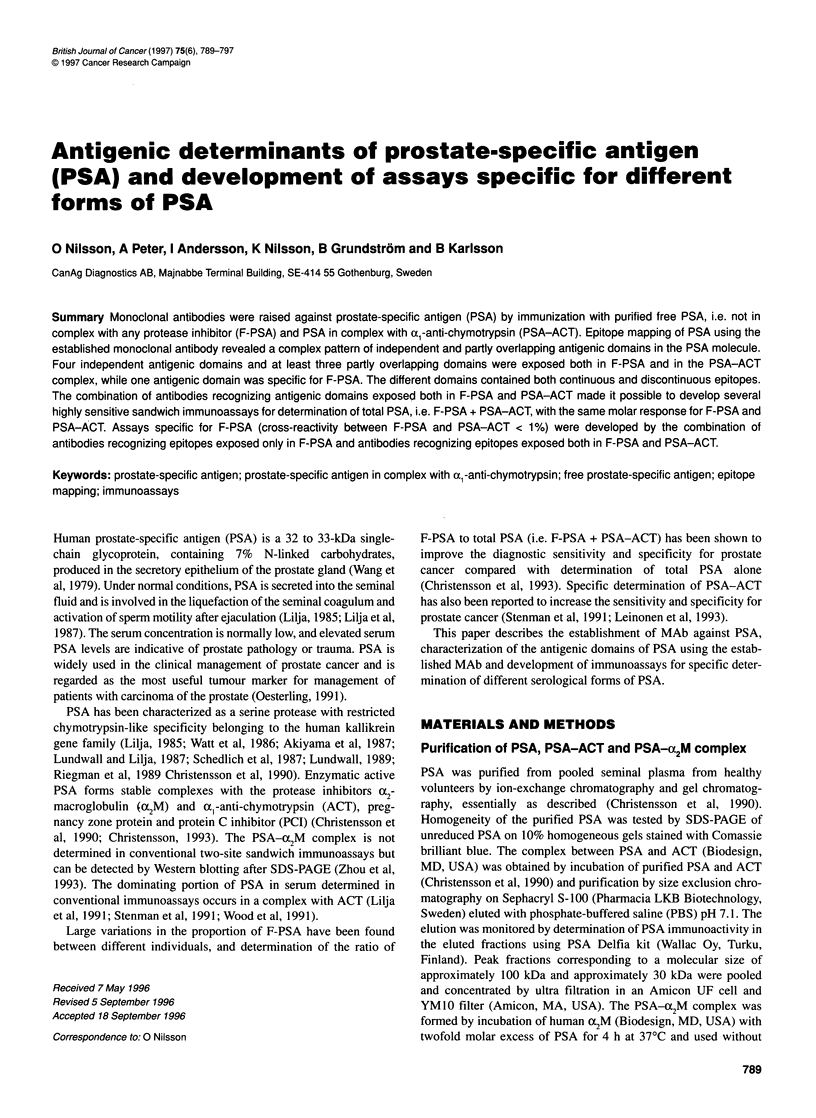
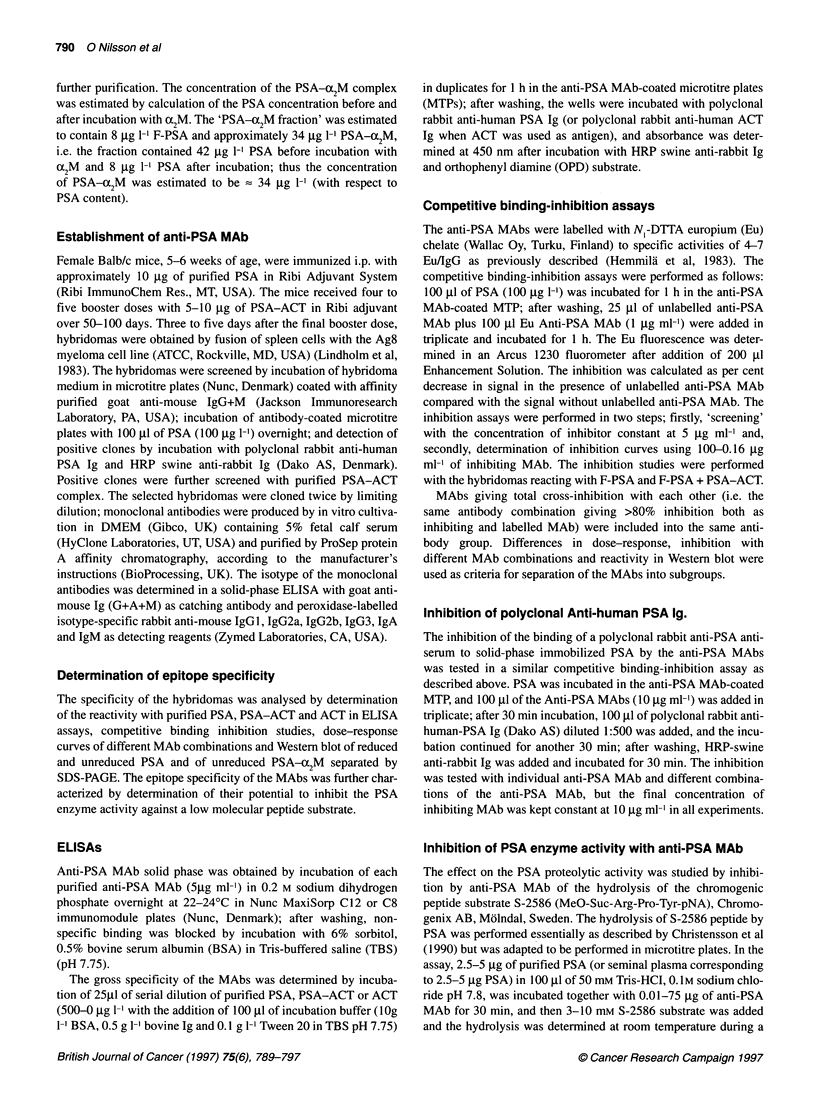
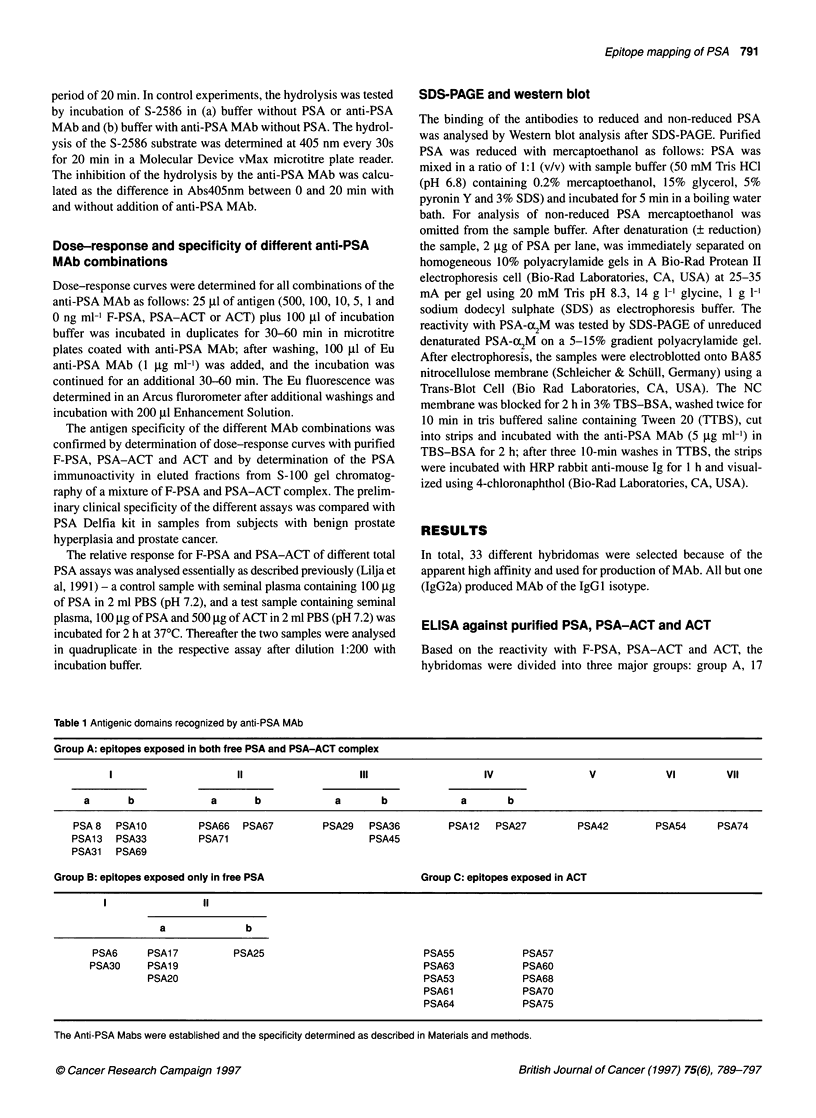
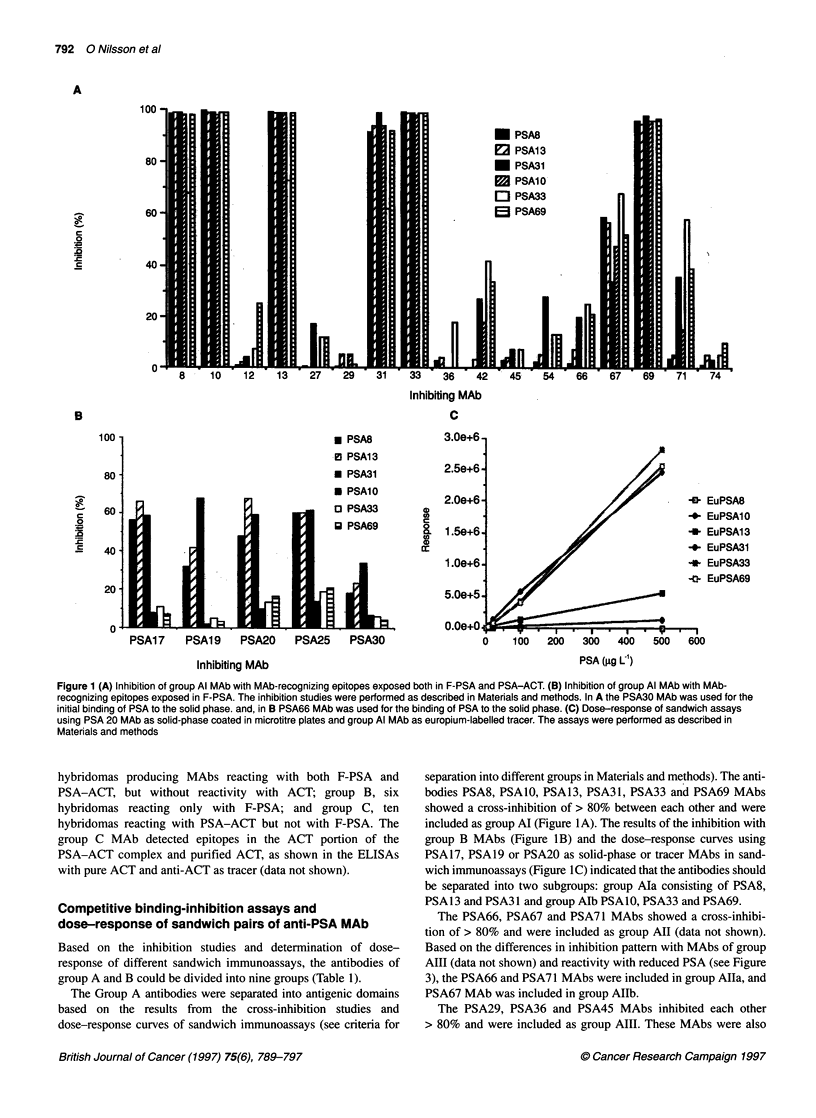
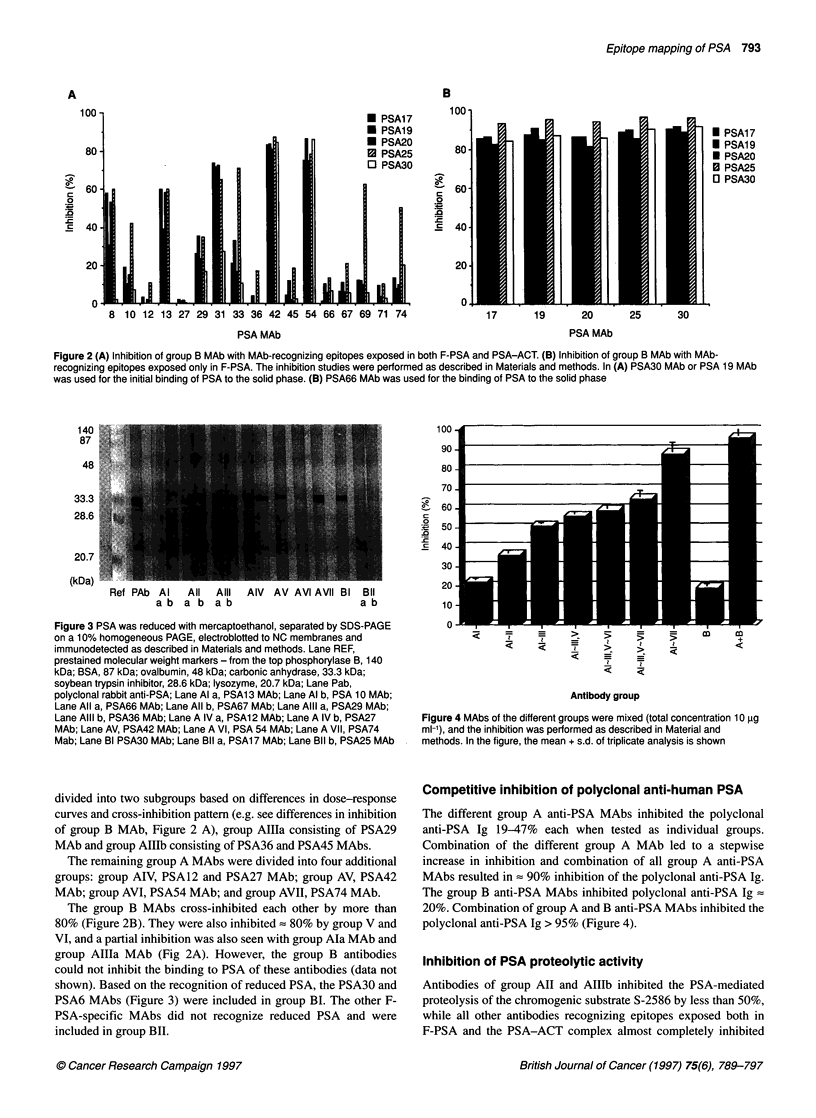
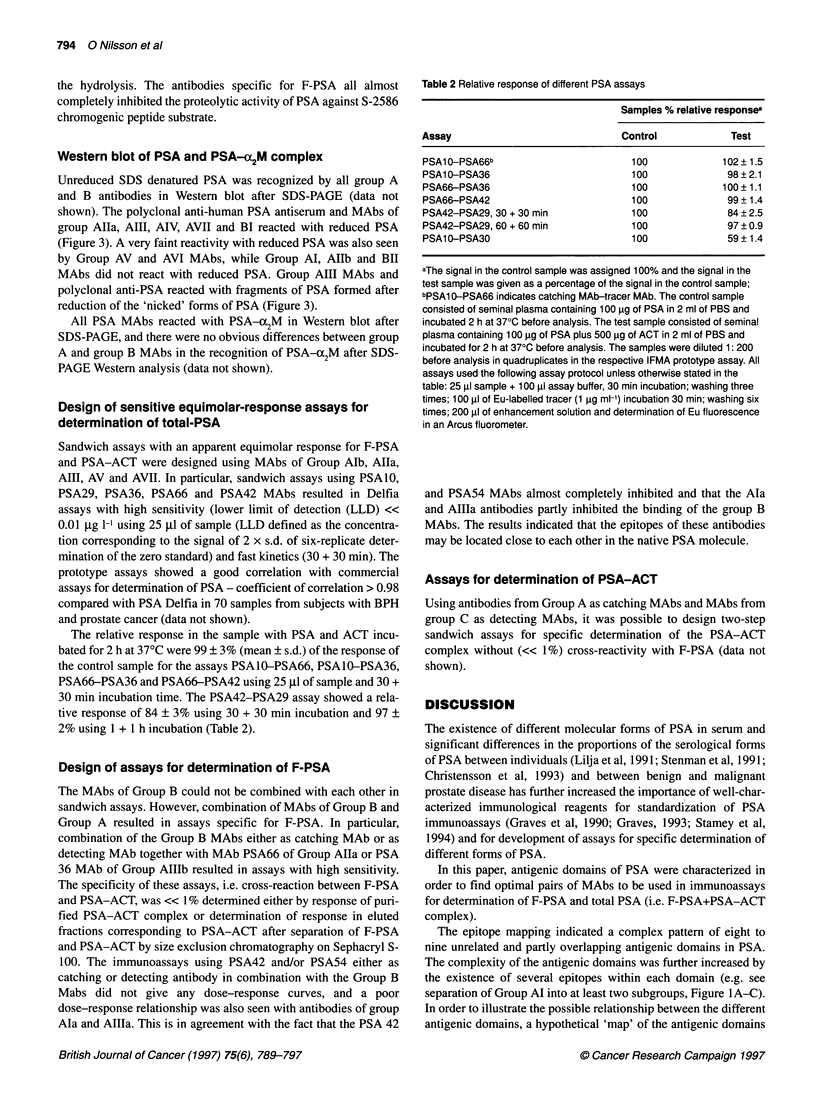
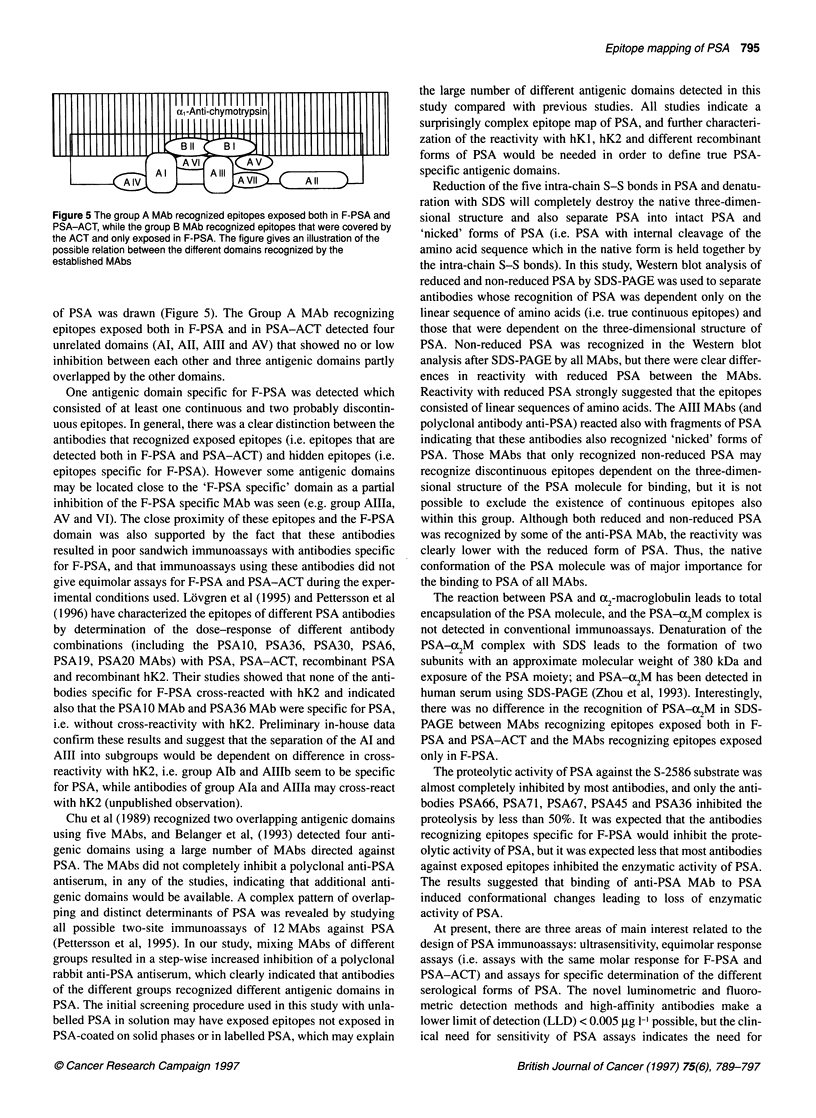
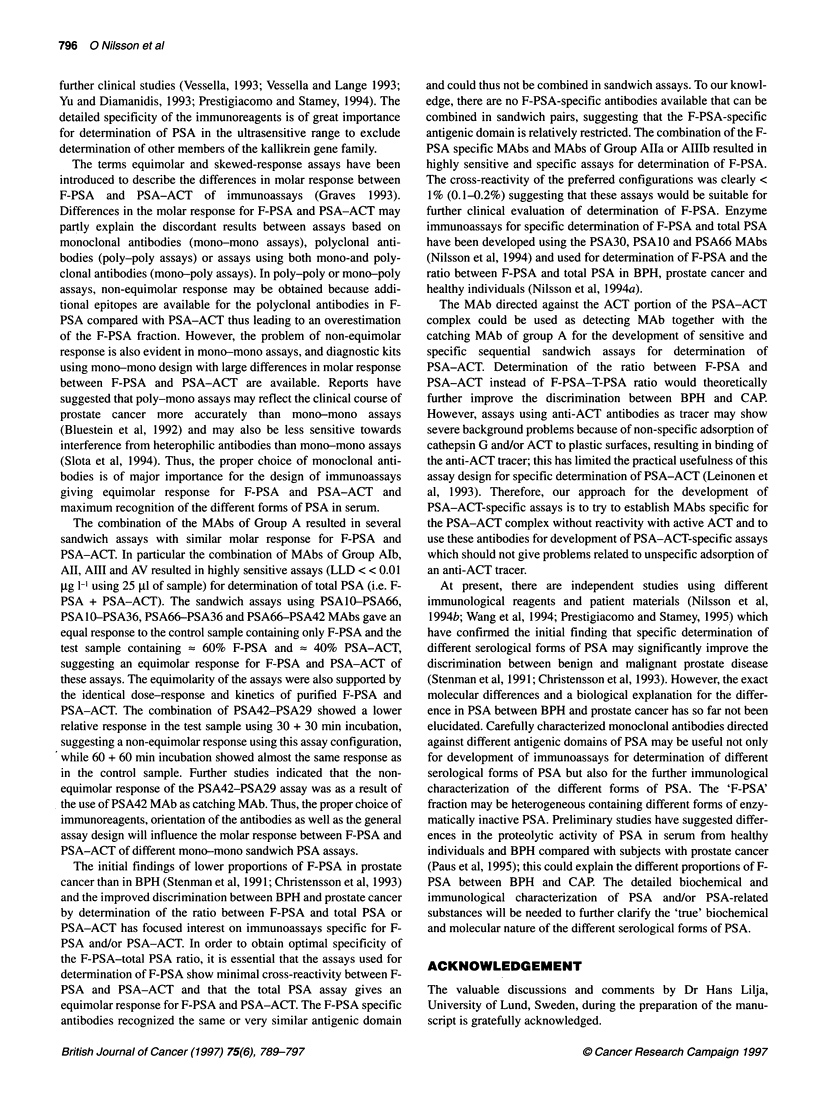
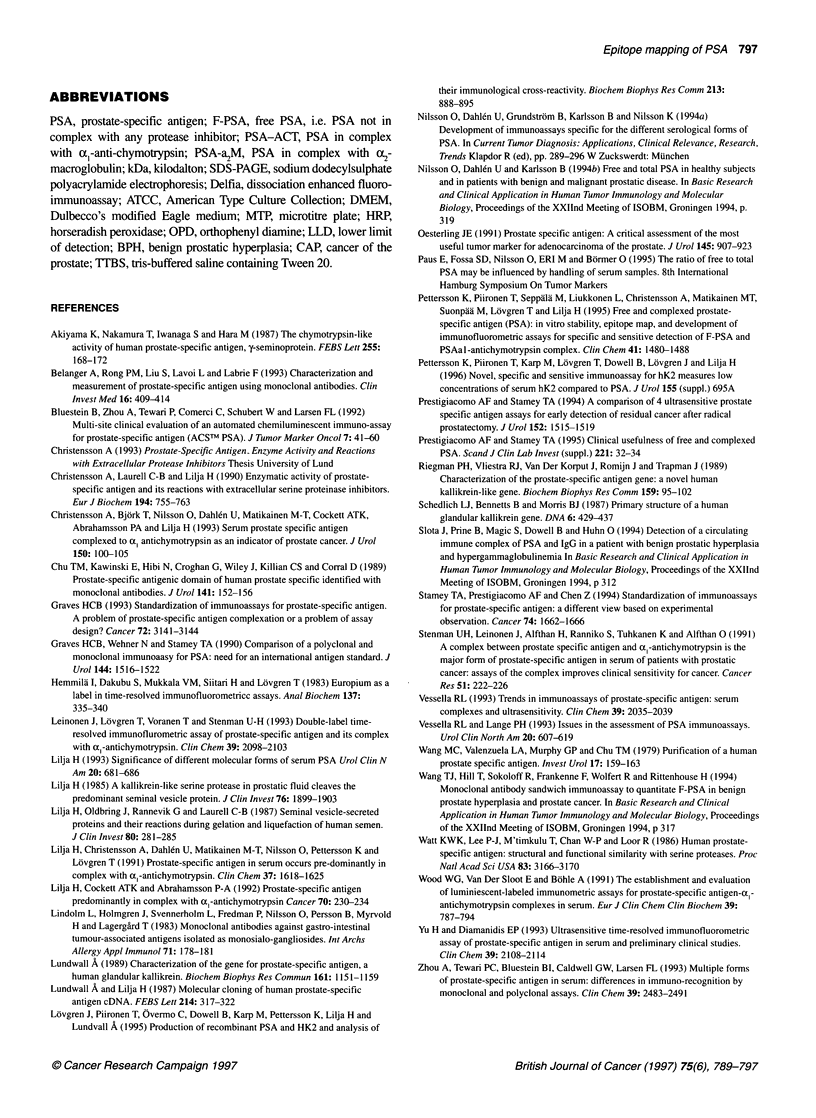
Images in this article
Selected References
These references are in PubMed. This may not be the complete list of references from this article.
- Akiyama K., Nakamura T., Iwanaga S., Hara M. The chymotrypsin-like activity of human prostate-specific antigen, gamma-seminoprotein. FEBS Lett. 1987 Dec 10;225(1-2):168–172. doi: 10.1016/0014-5793(87)81151-1. [DOI] [PubMed] [Google Scholar]
- Bélanger A., Rong P. M., Liu S., Lavoie L., Labrie F. Characterization and measurement of prostate-specific antigen using monoclonal antibodies. Clin Invest Med. 1993 Dec;16(6):409–414. [PubMed] [Google Scholar]
- Christensson A., Björk T., Nilsson O., Dahlén U., Matikainen M. T., Cockett A. T., Abrahamsson P. A., Lilja H. Serum prostate specific antigen complexed to alpha 1-antichymotrypsin as an indicator of prostate cancer. J Urol. 1993 Jul;150(1):100–105. doi: 10.1016/s0022-5347(17)35408-3. [DOI] [PubMed] [Google Scholar]
- Christensson A., Laurell C. B., Lilja H. Enzymatic activity of prostate-specific antigen and its reactions with extracellular serine proteinase inhibitors. Eur J Biochem. 1990 Dec 27;194(3):755–763. doi: 10.1111/j.1432-1033.1990.tb19466.x. [DOI] [PubMed] [Google Scholar]
- Chu T. M., Kawinski E., Hibi N., Croghan G., Wiley J., Killian C. S., Corral D. Prostate-specific antigenic domain of human prostate specific antigen identified with monoclonal antibodies. J Urol. 1989 Jan;141(1):152–156. doi: 10.1016/s0022-5347(17)40630-6. [DOI] [PubMed] [Google Scholar]
- Graves H. C. Standardization of immunoassays for prostate-specific antigen. A problem of prostate-specific antigen complexation or a problem of assay design? Cancer. 1993 Dec 1;72(11):3141–3144. doi: 10.1002/1097-0142(19931201)72:11<3141::aid-cncr2820721104>3.0.co;2-1. [DOI] [PubMed] [Google Scholar]
- Graves H. C., Wehner N., Stamey T. A. Comparison of a polyclonal and monoclonal immunoassay for PSA: need for an international antigen standard. J Urol. 1990 Dec;144(6):1516–1522. doi: 10.1016/s0022-5347(17)39789-6. [DOI] [PubMed] [Google Scholar]
- Hemmilä I., Dakubu S., Mukkala V. M., Siitari H., Lövgren T. Europium as a label in time-resolved immunofluorometric assays. Anal Biochem. 1984 Mar;137(2):335–343. doi: 10.1016/0003-2697(84)90095-2. [DOI] [PubMed] [Google Scholar]
- Leinonen J., Lövgren T., Vornanen T., Stenman U. H. Double-label time-resolved immunofluorometric assay of prostate-specific antigen and of its complex with alpha 1-antichymotrypsin. Clin Chem. 1993 Oct;39(10):2098–2103. [PubMed] [Google Scholar]
- Lilja H. A kallikrein-like serine protease in prostatic fluid cleaves the predominant seminal vesicle protein. J Clin Invest. 1985 Nov;76(5):1899–1903. doi: 10.1172/JCI112185. [DOI] [PMC free article] [PubMed] [Google Scholar]
- Lilja H., Christensson A., Dahlén U., Matikainen M. T., Nilsson O., Pettersson K., Lövgren T. Prostate-specific antigen in serum occurs predominantly in complex with alpha 1-antichymotrypsin. Clin Chem. 1991 Sep;37(9):1618–1625. [PubMed] [Google Scholar]
- Lilja H., Cockett A. T., Abrahamsson P. A. Prostate specific antigen predominantly forms a complex with alpha 1-antichymotrypsin in blood. Implications for procedures to measure prostate specific antigen in serum. Cancer. 1992 Jul 1;70(1 Suppl):230–234. doi: 10.1002/1097-0142(19920701)70:1+<230::aid-cncr2820701310>3.0.co;2-y. [DOI] [PubMed] [Google Scholar]
- Lilja H., Oldbring J., Rannevik G., Laurell C. B. Seminal vesicle-secreted proteins and their reactions during gelation and liquefaction of human semen. J Clin Invest. 1987 Aug;80(2):281–285. doi: 10.1172/JCI113070. [DOI] [PMC free article] [PubMed] [Google Scholar]
- Lindholm L., Holmgren J., Svennerholm L., Fredman P., Nilsson O., Persson B., Myrvold H., Lagergård T. Monoclonal antibodies against gastrointestinal tumour-associated antigens isolated as monosialogangliosides. Int Arch Allergy Appl Immunol. 1983;71(2):178–181. doi: 10.1159/000233384. [DOI] [PubMed] [Google Scholar]
- Lundwall A. Characterization of the gene for prostate-specific antigen, a human glandular kallikrein. Biochem Biophys Res Commun. 1989 Jun 30;161(3):1151–1159. doi: 10.1016/0006-291x(89)91362-4. [DOI] [PubMed] [Google Scholar]
- Lundwall A., Lilja H. Molecular cloning of human prostate specific antigen cDNA. FEBS Lett. 1987 Apr 20;214(2):317–322. doi: 10.1016/0014-5793(87)80078-9. [DOI] [PubMed] [Google Scholar]
- Lövgren J., Piironen T., Overmo C., Dowell B., Karp M., Pettersson K., Lilja H., Lundwall A. Production of recombinant PSA and HK2 and analysis of their immunologic cross-reactivity. Biochem Biophys Res Commun. 1995 Aug 24;213(3):888–895. doi: 10.1006/bbrc.1995.2212. [DOI] [PubMed] [Google Scholar]
- Oesterling J. E. Prostate specific antigen: a critical assessment of the most useful tumor marker for adenocarcinoma of the prostate. J Urol. 1991 May;145(5):907–923. doi: 10.1016/s0022-5347(17)38491-4. [DOI] [PubMed] [Google Scholar]
- Pettersson K., Piironen T., Seppälä M., Liukkonen L., Christensson A., Matikainen M. T., Suonpä M., Lövgren T., Lilja H. Free and complexed prostate-specific antigen (PSA): in vitro stability, epitope map, and development of immunofluorometric assays for specific and sensitive detection of free PSA and PSA-alpha 1-antichymotrypsin complex. Clin Chem. 1995 Oct;41(10):1480–1488. [PubMed] [Google Scholar]
- Prestigiacomo A. F., Stamey T. A. A comparison of 4 ultrasensitive prostate specific antigen assays for early detection of residual cancer after radical prostatectomy. J Urol. 1994 Nov;152(5 Pt 1):1515–1519. doi: 10.1016/s0022-5347(17)32459-x. [DOI] [PubMed] [Google Scholar]
- Prestigiacomo A. F., Stamey T. A. Clinical usefulness of free and complexed PSA. Scand J Clin Lab Invest Suppl. 1995;221:32–34. doi: 10.3109/00365519509090561. [DOI] [PubMed] [Google Scholar]
- Riegman P. H., Vlietstra R. J., van der Korput J. A., Romijn J. C., Trapman J. Characterization of the prostate-specific antigen gene: a novel human kallikrein-like gene. Biochem Biophys Res Commun. 1989 Feb 28;159(1):95–102. doi: 10.1016/0006-291x(89)92409-1. [DOI] [PubMed] [Google Scholar]
- Schedlich L. J., Bennetts B. H., Morris B. J. Primary structure of a human glandular kallikrein gene. DNA. 1987 Oct;6(5):429–437. doi: 10.1089/dna.1987.6.429. [DOI] [PubMed] [Google Scholar]
- Stamey T. A., Prestigiacomo A. F., Chen Z. Standardization of immunoassays for prostate specific antigen. A different view based on experimental observations. Cancer. 1994 Sep 15;74(6):1662–1666. doi: 10.1002/1097-0142(19940915)74:6<1662::aid-cncr2820740604>3.0.co;2-k. [DOI] [PubMed] [Google Scholar]
- Vessella R. L., Lange P. H. Issues in the assessment of PSA immunoassays. Urol Clin North Am. 1993 Nov;20(4):607–619. [PubMed] [Google Scholar]
- Vessella R. L. Trends in immunoassays of prostate-specific antigen: serum complexes and ultrasensitivity. Clin Chem. 1993 Oct;39(10):2035–2039. [PubMed] [Google Scholar]
- Wang M. C., Valenzuela L. A., Murphy G. P., Chu T. M. Purification of a human prostate specific antigen. Invest Urol. 1979 Sep;17(2):159–163. [PubMed] [Google Scholar]
- Watt K. W., Lee P. J., M'Timkulu T., Chan W. P., Loor R. Human prostate-specific antigen: structural and functional similarity with serine proteases. Proc Natl Acad Sci U S A. 1986 May;83(10):3166–3170. doi: 10.1073/pnas.83.10.3166. [DOI] [PMC free article] [PubMed] [Google Scholar]
- Wood W. G., van der Sloot E., Böhle A. The establishment and evaluation of luminescent-labelled immunometric assays for prostate-specific antigen-alpha 1-antichymotrypsin complexes in serum. Eur J Clin Chem Clin Biochem. 1991 Dec;29(12):787–794. doi: 10.1515/cclm.1991.29.12.787. [DOI] [PubMed] [Google Scholar]
- Yu H., Diamandis E. P. Ultrasensitive time-resolved immunofluorometric assay of prostate-specific antigen in serum and preliminary clinical studies. Clin Chem. 1993 Oct;39(10):2108–2114. [PubMed] [Google Scholar]
- Zhou A. M., Tewari P. C., Bluestein B. I., Caldwell G. W., Larsen F. L. Multiple forms of prostate-specific antigen in serum: differences in immunorecognition by monoclonal and polyclonal assays. Clin Chem. 1993 Dec;39(12):2483–2491. [PubMed] [Google Scholar]



